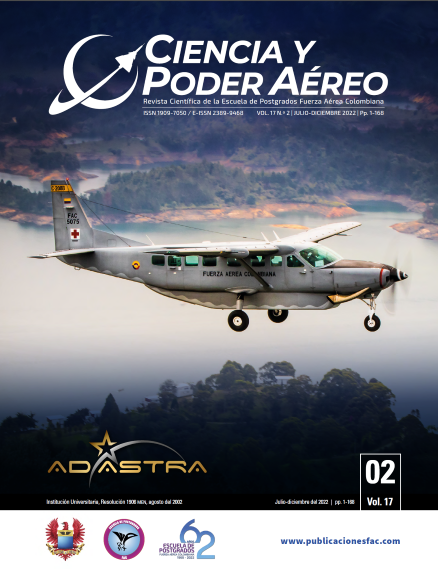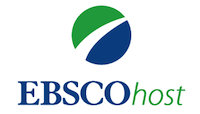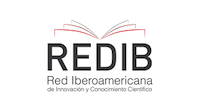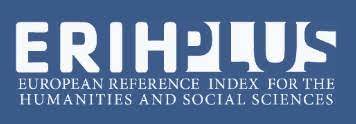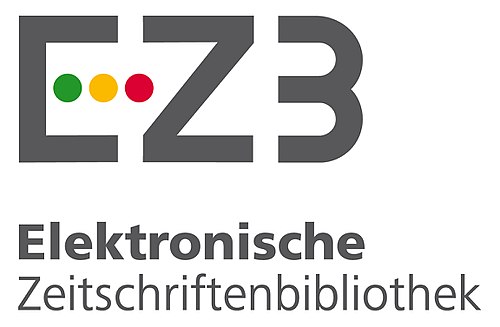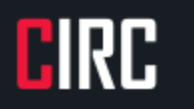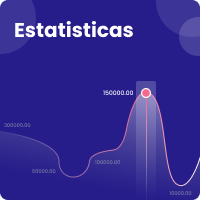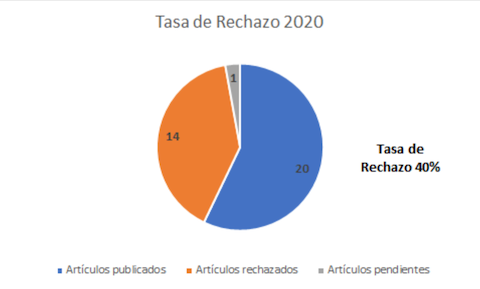Desenvolvimento de um protótipo de software de acordo com a metodologia design thinking para a padronização do processo logístico não aeronáutico no nível tático na Força Aérea Colombiana
DOI:
https://doi.org/10.18667/cienciaypoderaereo.754Palavras-chave:
Design thinking, empatia, ideação, logística, teste, protótipo, sofwareResumo
A Força Aérea Colombiana é uma instituição do setor público com uma estrutura piramidal militar. Sua razão de ser é atender às necessidades de segurança e defesa do país, a fim de contribuir para o cumprimento dos propósitos essenciais do Estado. Sua função é exercida por um recurso humano com alta rotatividade em diferentes níveis de comando e impacta o planejamento institucional a curto, médio e longo prazo, promovendo o crescimento e a gestão em um ambiente complexo que dificulta o cumprimento de seus objetivos.
Este comportamento se reflete na cultura e missão do processo logístico não aeronáutico, que se baseia na gestão diária dos esforços individuais e isolados para fornecer os meios necessários para o funcionamento das unidades militares e o desenvolvimento das operações aéreas. Esta pesquisa desenvolve o protótipo de um software sob a metodologia do pensamento do projeto como uma ferramenta ideal e fundamental para padronizar e otimizar, do ponto de vista funcional e técnico, o funcionamento do processo logístico não aeronáutico no nível tático da instituição.
O projeto de protótipo de software é desenvolvido de acordo com a metodologia do pensamento do projeto, em suas fases: (1) empatizar, (2) definir, (3) elaborar, (4) prototipar e (5) testar. A situação problemática foi abordada para construir a solução proposta que se materializa com a definição do esquema documental, representado na atualização da estrutura organizacional com respeito aos cargos e ao manual de funções, ao procedimento e ao formato de processamento dos serviços. Isto apóia o desenvolvimento do protótipo de software que padronizará e otimizará a operação do processo logístico não aeronáutico no nível tático da Força Aérea Colombiana, que conseqüentemente otimizará o uso dos recursos, melhorará o ambiente de trabalho e melhorará a qualidade dos bens e serviços necessários para a operação.
Downloads
Referências
Antún-Callaba, J. P. y Ojeda-Toche, L. (2004). “Benchmarking” de procesos logísticos. Ingeniería Investigación y Tecnología, 5(1), 59-76. https://doi.org/10.22201/fi.25940732e.2004.05n1.005
Bolaños Castro, S. J., Lopez Bello, C. A. y Mendez Giraldo, G. A. (2015). La logística como estrategia para proveer de inteligencia a las organizaciones. Redes de Ingeniería, 6. https://doi.org/10.14483/2248762x.8497
Brown, T. (2019). Design thinking. Harvard Business Review. https://readings.design/PDF/Tim%20Brown,%20Design%20Thinking.pdf
Cámara de Comercio de Bogotá. (2019). Design thinking en el sector fintech: una forma de pensar para innovar. https://bibliotecadigital.ccb.org.co/handle/11520/22730
Carroll, N. y Richardson, I. (2016). Aligning healthcare innovation and software requirements through design thinking. Proceedings International Workshop on Software Engineering in Healthcare Systems, SEHS 2016, pp. 1-7. https://doi.org/10.1145/2897683.2897687
Castiblanco Jiménez, I. A., Mauro, S., Napoli, D., Marcolin, F., Vezzetti, E., Rojas Torres, M. C., Specchia, S. y Moos, S. (2021). Design thinking as a framework for the design of a sustainable waste sterilization system: The case of Piedmont Region, Italy. Electronics (Switzerland), 10(21). https://doi.org/10.3390/electronics10212665
Delgado Huerta, J., Vargas Cirilo, H. R., Marnique Ortega, T. P. y Osorio Céspedes, E. J. (2021). Aplicación de Design Thinking para el diseño de un modelo de gestión del impacto social y medioambiental para empresas del sector industrial: Plan para la dirección del proyecto basado en la guía del PMBOK (tesis de grado, Universidad Peruana de Ciencias Aplicadas. https://repositorioacademico.upc.edu.pe/handle/10757/656676?show=full
Fernández Iglesias, M. J. (2020). Prototipado rápido en Design Thinking. https://doi.org/10.17605/OSF.IO/JWNRA
Fuerza Aérea Colombiana (FAC). (2020). Estrategia para el Desarrollo Aéreo y Espacial de la Fuerza Aérea Colombiana 2042. FAC. https://www.fac.mil.co/sites/default/files/2021-04/edaes.pdf
Henao Santa, J. D. (2021). El design thinking y el mapa de empatía con énfasis social en proyectos de ingeniería: proyectos de diseño en soluciones bajo metodologías agiles de la Institución Universitaria Pascual Bravo (tesis de maestría, Universidad Eafit), pp. 1-58. https://repository.eafit.edu.co/handle/10784/29578
Homburg, C., Schafer, H. y Schneider, J. (2012). Sales Excellence: Systematic Sales Management (Management for Professionals 18). Springer.
Meinel, C., Leifer, L. y Plattner, H. (2015). Design Thinking Research - Building Innovators. Springer.
Mejía-López, J. A., Ruiz-Guzmán, O. A., Gaviria-Ocampo, L. N. y Ruiz-Guzmán, C. P. (2019). Aplicación de metodología design thinking en el desarrollo de cortadora automática CNC para mipymes de confección. Revista UIS Ingenierías, 18(3), 157-168. https://doi.org/10.18273/revuin.v18n3-2019016
Mendoza, G. E., Laureano de Jesús, Y., Somodevilla García, M. J. y Pérez de Celis Herrero, M. C. (2019). Minería de datos como herramienta de prevención de muertes que involucran violencia intrafamiliar en la sociedad mexicana. Innovaciones tecnológicas en las ciencias computacionales (M. del C. Santiago Díaz, coord.; pp. 75-87). Montiel & Soriano Editores.
Pavetto, E. S., Alonso, L. P. J., Sartor, J., & Cecilia, M. (2009). Universidad Nacional del Litoral Facultad de Humanidades y Ciencias. 2, 1-2.
Plattner, H. (2018). An introduction to Design Thinking. Process guide. Institute of Design at Stanford. https://web.stanford.edu/~mshanks/MichaelShanks/files/509554.pdf
Ponjuán Dante, G. (2011). La gestión de información y sus modelos representativos. Valoraciones. Ciencias de La Información, 42(2), 11-17. https://www.redalyc.org/pdf/1814/181422294003.pdf
Rosales Chávez, J., Cruz López, L., Domínguez Arce, D. y Parra Castrillón, J. E. (2019). Las rutas posibles de los proyectos de innovación: un análisis de casos. Ingenierías USBMed, 10(1), 58-67. https://doi.org/10.21500/20275846.3819
Rosas Madrigal, G., Ruiz González, S., Martínez Hernández, N. O., Cantú Rodríguez, M. de la L. y Enríquez de León, A. (2018). Manual de Design Thinking. http://www.utsc.edu.mx/vidaEstudiantil/pdf/pdf_pades/manual_design_thinking.pdf
Serrano Ortega, M. y Blázquez Ceballos, P. (2015). Design thinkers: lidera el presente, crea el futuro. ESIC Editorial.
Universidad de Stanford. (2010a). Introducción al pensamiento de diseño. Guía de proceso. Instituto de Diseño Universidad de Stanford.
Universidad de Stanford. (2010b). Una introducción a la guía del proceso del pensamiento de diseño. Instituto de Diseño Universidad de Stanford.
Tschimmel, K. (2012). Design thinking as an effective toolkit for innovation (ponencia). XXIII ISPIM Conference: Action for Innovation: Innovating from Experience.
Vásquez Gutiérrez, J. D. (2018). Desarrollo de una aplicación móvil que permita la interacción paciente-médico-especialista en poblaciones de áreas rurales de Colombia (tesis de maestría, Universidad Pontificia Bolivariana). https://repository.upb.edu.co/handle/20.500.11912/4104
Downloads
Publicado
Edição
Seção
Licença
Copyright (c) 2022 Escuela de Postgrados de la Fuerza Aérea Colombiana

Este trabalho está licenciado sob uma licença Creative Commons Attribution 4.0 International License.
Declaração de cessão de direitos autorais à revista
O autor cede exclusivamente à Revista os direitos de exploração (reprodução, distribuição, comunicação pública e transformação) para explorar e comercializar a obra, no todo ou em parte, em todos os formatos e modalidades de exploração presentes ou futuros, em todas as línguas, por todo o período de vida da obra e pelo mundo inteiro.
Todo o conteúdo publicado na revista científica Ciencia y Poder Aéreo está sujeito à licença de reconhecimento internacional Creative Commons 4.0, cujo texto completo pode ser encontrado em http://creativecommons.org/licenses/by/4.0/
A licença permite que qualquer usuário baixe, imprima, extraia, arquive, distribua e comunique publicamente este artigo, desde que seja dado o devido crédito aos autores: ao(s) autor(es) do texto e a Ciencia y Poder Aéreo, Revista da Escola de Pós-Graduação da Força Aérea Colombiana. Exceto quando for indicado o contrário, o conteúdo deste site será licenciado sob uma licença Creative Commons Attribution 4.0 Internacional.
Para usos de conteúdo não previstos nestas normas de publicação é necessário entrar em contato diretamente com o diretor ou editor da revista através do e-mail cienciaypoderaereo1@gmail.com
A Escola de Pós-Graduação da Força Aérea Colombiana e esta revista não são responsáveis pelos conceitos expressos nos artigos, nem pelos metadados fornecidos ou pelas afiliações que os autores declarem, sendo assim de inteira responsabilidade dos autores.

Licença Creative Commons
Os autores concedem à revista os direitos de exploração (reprodução, distribuição, comunicação pública e transformação) para explorar e comercializar a obra, inteira ou parcialmente, em todos os formatos e modalidades de exploração presentes ou futuras, em todas as línguas, por todo o período de vida da obra e no mundo inteiro.
Todos os conteúdos publicados na revista científica Ciencia y Poder Aéreo estão sujeitos à licença de reconhecimento 4.0 4.0 Internacional de Creative Commons, cujo texto completo pode-se consultar em http://creativecommons.org/licenses/by/4.0/
A licença permite a qualquer usuário baixar, imprimir, extrair, arquivar, distribuir e comunicar publicamente um artigo, desde que seja dado crédito aos autores do trabalho: aos autores do texto e a Ciencia y Poder Aéreo, Revista Científica da Escola de Pós-Graduação da Força Aérea Colombiana. Salvo onde for indicado o contrário, o conteúdo deste site é licenciado sob uma licença Creative Commons Atribución 4.0 internacional.
Para usos de conteúdo não previstos nestas normas de publicação é necessário entrar em contato diretamente com o diretor ou editor da revista através do e-mail cienciaypoderaereo1@gmail.com
A Escola de Pós-Graduação da Força Aérea Colombiana e esta revista não são responsáveis pelos conceitos expressos nos artigos, nem pelos metadados fornecidos ou pelas afiliações que os autores declarem, sendo assim de inteira responsabilidade dos autores.

